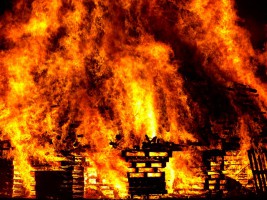Since the dawn of time, fire has been one of the most precious things known to, and exclusively used by, mankind. Nevertheless, as much as fire can keep us warm, safe and well-fed, it can also be dangerous and downright terrifying when not handled carefully. (Case in point: the recent explosion at a Taiwan water park, which injured over 500 people.) Although the statistics stated in the infographics are from Britian, the advice given is still relevant in Malaysian society, and it would definitely help to reduce the number of fire-related accidents that can affect our personal safety, property, and even result in death. Let us take a look at some of the statistics and common causes of fire emergencies, what causes fatalities in event of a fire, and how to prevent fires from occurring.
Here are some fire-y facts to get you clued in:
- Smoking materials are the biggest cause of death in dwelling fires
- Cooking appliances cause more than 50% of dwelling fires
- One third (1/3) of deaths caused by fires were due to lack of smoke alarms
- Elderly people (aged 65 and over) are 2x as likely to die in a fire
In fact, being burned to death is not the main cause of death in most cases (it’s a close second); many fatalities are caused by asphyxiation due to the gas, smoke and toxic fumes emitted from the fire.
In Malaysia, a large number of home-related fire or safety incidents happen on a daily basis, usually small ones. However, there have also been cases where huge amounts of damage to property and loss of lives have occurred due to fires in residential or commercial areas. Therefore, local Fire and Rescue Departments are working to cut down on fire-related deaths by encouraging families, offices and retail shops to purchase self-contained smoke detectors to monitor accidental smoke and flames, which is easy to install and only requires a 9V battery to work. A small fire extinguisher, which can be bought in most supermarkets or hypermarkets, would also be handy to keep in the kitchen or office pantry. Of course, awareness through education and neighbourhood demonstrations are also steps taken by the authorities to help lessen the amount of fire-related emergencies.
Ways to prevent fire:
- Use smoke alarms
- Test and change batteries regularly
- Set alarms in the middle of ceilings, landings or hallways where they won’t be easily triggered by accident and can be heard easily
- Switch off and unplug electrical appliances when not in use or away for extended periods of time
- Keep electrical devices away from water
- Use correct fuses in plugs
- Extinguish burning candles at night or before going out, especially on altars
- Don’t leave a lit stove unattended
- Smoke outdoors and extinguish cigarettes properly
- Do not let children play with lighters or matches
There are many other ways to prevent fires, but we hope these few tips and advice will be able to help increase knowledge about the dangers and cause of fires, and prevent accidental fires.
References
Alarm Traders Direct (link)
Esquire Malaysia (link)
The Star Online (link)








